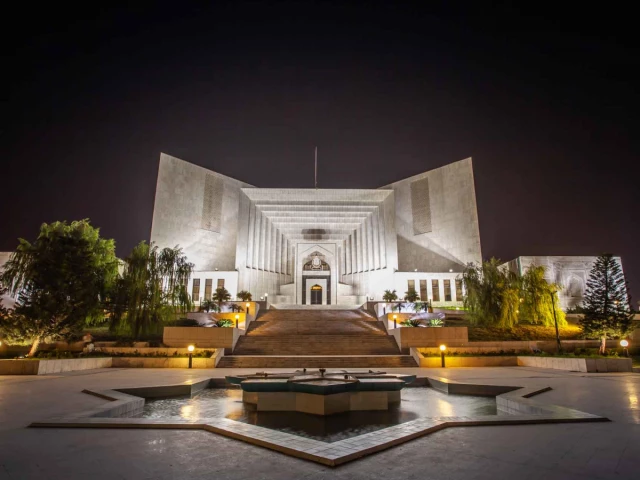Akram Sheikh urges CB to constitute 24-member bench to hear plea against 26th Amendment
ISLAMABAD:
Senior advocate Akram Sheikh has argued before the Supreme Court that the motive behind the 26th constitutional amendment was to prevent the inquiry into the parliamentary elections last February.
Sheikh, who himself has challenged the 26th constitutional amendment, on Monday presented his arguments before the eight-member Constitution Bench (CB), headed by Justice Amin-ud-Din Khan.
The lawyer stated that the background for this change is relevant.
He claimed that there was an election in the country and some people believed that there would be control of the election. To prevent accountability and to avoid such an inquiry, the 26th constitutional amendment was introduced last year, he claimed.
Legal and political experts discuss the reasoning given by the lawyer during his arguments.
After the Supreme Court’s majority verdict in the reserved seats case last July, there were fears in the government ranks that the apex court might probe the February 8 elections following the retirement of former Chief Justice of Pakistan (CJP) Qazi Faez Isa.
Even Defense Minister Khawaja Asif had consistently expressed concern over the possibility of a revision of the 2024 elections after Justice Isa’s retirement.
Before former CJP Umar Ata Bandial retired, the PML-N led government had issued the notification for Justice Isa as the next CJP. However, it did not issue a similar notice to the chief puisne judge, Syed Mansoor Ali Shah, ahead of Isa’s retirement in October last year.
Instead, it awaited the passage of the 26th Constitutional Amendment, which stipulated that the CJP would be appointed from among the top three SC judges by a parliamentary committee.
In the end, the government members of the committee supported the nomination of Justice Yahya Afridi as the new CJP. He was number three on the Supreme Court’s seniority list.
There was no explanation as to why Justice Shah was ignored by the committee.
However, legal experts believe that the executive branch has succeeded in influencing judicial decision-making after the 26th constitutional amendment. Even the current government has obtained relief in three crucial cases from the apex court’s CBs.
The CBs approved the trial of civilians by military courts and the transfer of judges to the Islamabad High Court. Another CB overturned the Supreme Court’s judgment on July 13 in the case of reserved seats. As a result, the government managed to secure a two-thirds majority in the National Assembly.
During his arguments, Akram Sheikh suggested to the bench that an order should be passed constituting a 24-member full court to hear the petitions against the 26th Amendment.
Sheikh stated that the current CB, itself a creation of the 26th constitutional amendment, could not hear this case. He argued that the CB is not a separate court like the Federal Sharia Court; it is rather a bench in the Supreme Court itself.
The judges sitting on this bench are members of the Supreme Court of Pakistan as well as members of the CB. In a way, they wear two hats – one in their capacity as Supreme Court judges and the other as members of the CB.
In their capacity as members of the CB, it is logically and legally impossible for them to declare the 26th Amendment invalid. Such declaration can only be issued by a court of competent jurisdiction.
If the 26th Amendment is held invalid, then the very foundation on which the bench has been constituted would collapse. If the amendment itself is invalid, the constitution of the bench under it is also legally ineffective.
In that case, the very source of the Court’s judicial authority would cease to exist, rendering the CB devoid of any legitimate existence in the eyes of the law. The bench, he said, “cannot possibly cut the branch it sits on.”
Therefore, the only “hat” available to the Court to issue an effective declaration and provide a remedy is that of the High Court Judges. The other hat, he said, would “dissolve in thin air”.
“Fortunately, the members of the bench would still keep their heads but not their hats,” Sheikh noted. “Therefore, the only institution capable of upholding the principle of ‘Ubi jus ibi remedium’ is the Supreme Court as an institution, and not its CB.”
He also raised the question of whether parliament could abolish the judiciary, which is one of the most important features of the constitution. He said the entire legal system rests on the basic principle expressed in Latin as “Ubi jus ibi remedium” – where there is a right, there is a remedy.
“If the benefits of a right are denied to any person, then the ultimate institution to determine the validity of such a claim is the courts of Pakistan. The Supreme Court of Pakistan is the supreme institution which has this judicial power,” he concluded.



